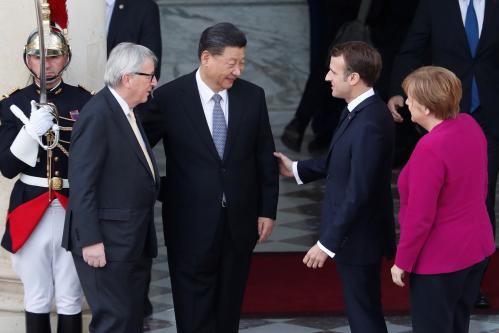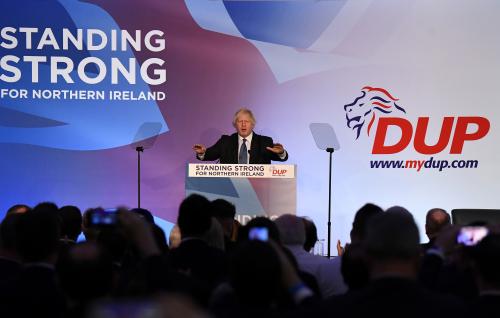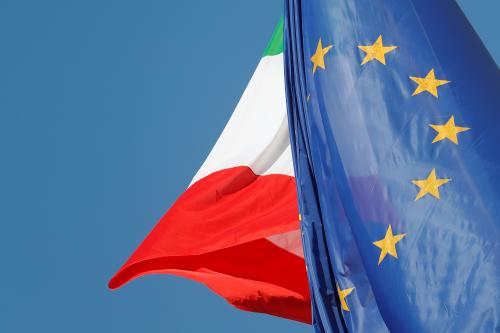Is Brexit proof that Europe is not working? In fact, what Brexit demonstrates is rather that, in some cases, national democracies can become dysfunctional—when complex decisions cross national boundaries and have huge effects, for instance. This is a problematic and confusing finding. It only follows that the EU cannot work if its constituent national democracies do not work.
Thomas Jefferson was the most famous advocate of the need for a well-informed electorate in the functioning of a democracy. Well-informed voters must be able to trace a rational link between their choice, whatever it is, and its consequences. We now know that the rational link was unknown to many British voters, as well as to their political representatives—not only before the vote, but even after it, since we discovered that they had prepared no post-Brexit plan.
When national democracies work this badly, the consequences reach well beyond their borders. The effects of Brexit on the governance of Europe are clear at least in one way: Brexit increases the risks around Europe. When risks increase, what changes is the balance between the two strategies that we pursue to govern the EU: risk reduction at the national level and risk sharing at the community level. Those two strategies need to advance hand in hand. However, the higher the risks, the lower the willingness to share them. For stronger countries, solidarity becomes more costly; weaker countries are left to fend for themselves. During recent years, we have already seen mistrust and antagonism produce recession and rebellion against Europe. Another bout of uncertainty on the future of Europe would be politically and/or economically unsustainable.
[T]he higher the risks, the lower the willingness to share them. For stronger countries, solidarity becomes more costly; weaker countries are left to fend for themselves.
What is happening should not come as a surprise. Whenever citizens lose faith in the functioning of national politics, they also immediately turn against non-national politics. The polls show this, that the poor quality of national politics breeds mistrust in the supranational dimension. Often, low quality politicians help the transfer of mistrust, bashing Europe or their neighboring countries, in hopes of reconstructing their own flagging support at home.
Recent political events tell us that the increase in mistrust does not depend only, or even primarily, on the economy. Mistrust increases even in countries where economic growth is strong, like Poland, Great Britain, and the United States, all of which have historically low unemployment. In different ways, all these countries have a privileged position in the global economic atlas, yet the cracks in their society keep widening, following multiple underground courses that all led to some form of intolerance for strangers.
Against this backdrop, those who want to improve the way the EU and the euro area work face a daunting task. In fact, a federal or more cooperative Europe requires well-functioning national democracies where people trust the public powers and are not economically discouraged. Unfortunately, there do not seem to be many of this sort in the EU today.
The German government is probably the only one in the EU that looks ahead with a sense of stability and consensus. Nevertheless, its policy response to Brexit surrenders to the bitter findings about the quality of political discourse in European countries. Berlin is reversing its traditional course on the very gradual advance toward deeper political and institutional integration. The German government has set aside supranational or federalist ideas in favor of intergovernmental relations, with rationality determined by the balance of power or supposed coherence of collective choices guided by economic constraints. German Finance Minister Wolfgang Schäuble, probably the most federalist among German politicians, has turned against its traditional positions in favor of intergovernmental relations—where stronger countries have the upper hand and with Germany always on the right side of the knife. While political events in neighboring countries indicate a shift away from Europe’s rules and even from its principles and civil rights, Berlin has understandably become interested in reducing its risks. As previously stated, Brexit helped tilt the balance between risk-sharing and risk-reduction in favor of the latter. However, the experience of recent years has shown that this solution of “every man for himself” is not sustainable, politically or economically. A balance of power system between governments is inherently hierarchical, and the superiority of Berlin has been one of the reasons many Europeans are alienated from the idea of a shared policy and economy.
We find ourselves in extremely harsh conditions. The picture of weak national democracies becoming a hindrance to mutual respect and cooperation can be discouraging. Still, this is exactly where the dysfunctionality lies. We need to make national democracies stronger by making them internalize the European context. National public discourse must overcome borders, making national citizens well-informed Europeans. Despite its imperfections, European political integration should be strengthened, not abandoned.






Commentary
It’s not Europe. It’s national democracy that’s dysfunctional.
July 12, 2016